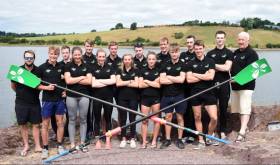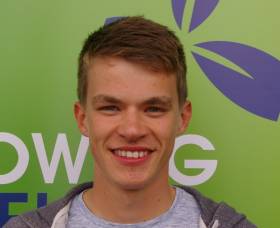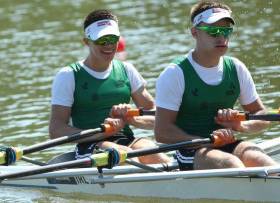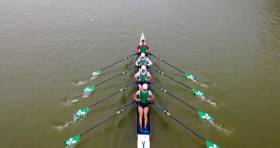Displaying items by tag: Fintan McCarthy
#Rowing: The McCarthy twins, Jake and Fintan, gave Ireland its fourth A Finalist at the World Under-23 Rowing Championships in Poland today. They finished second in the semi-final of the lightweight double sculls. This was a close race: Spain led early on and eventually won from fast-finishing Ireland, who had won a battle with New Zealand, who took the third qualifying spot, and Portugal, who took fourth.
The early stages looked very promising for the women’s lightweight double of Lydia Heaphy and Margaret Cremen in their semi-final. They led to 700 metres, but then Greece and, with a more consistent challenge, Italy, moved ahead. The early part of the third quarter saw the Ireland crew fight a battle with Australia. The Australians moved into a clear third and from there Ireland slipped back. They finished fifth, behind the Netherlands, who took fourth.
World Under-23 Rowing Championships, Day Four, Poznan, Poland
Men
Lightweight Double Sculls – Semi-Finals (First Three to A Final; rest to B Final) 1 Spain 6:41.66, 2 Ireland (F McCarthy, J McCarthy) 6:42.45, 3 New Zealand 6:44.17.
Single Sculls – Semi-Final (First Three to A Final; rest to B Final): 1 United States (B Davison) 7: 14.65, 2 Ireland (R Byrne) 7:17.88, 3 Germany (M Weber) 7:24.24.
Lightweight Single Sculls – D Final (Places 19 to 24): 2 Ireland (H Sutton) 7:21.95.
Women
Lightweight Double Sculls – Semi-Finals (First Three to A Final; rest to B Final): 1 Italy 7:24.69, 2 Australia 7:30.08, 3 Greece 7:31.23; 5 Ireland (L Heaphy, M Cremen) 7:47.66.
#Rowing: Jake and Fintan McCarthy raced brilliantly to win their heat and qualify directly for the A/B Semi-Finals at the World Under-23 Rowing Championships in Poland this morning. There was just one direct qualification place on offer in this heat of the lightweight double sculls and Italy gave Ireland quite a race. The two crews were locked together as they approached the 1500-metre mark – but then the McCarthy twins went. They led by .18 of a second at 1500 metres and sprinted away from their rivals to win well.
Lydia Heaphy and Margaret Cremen made a solid start to their campaign in the women’s lightweight double by taking the second and final qualification spot in their heat. They were fastest to the 500 metre mark, but Britain’s Susannah Duncan and Danielle Semple took over from there. They would build their lead to win by almost eight seconds. Cremen and Heaphy secured their spot, staying well clear of third-placed Poland.
World Under-23 Championships, Poznan, Poland (Irish interest; selected results)
Men
Lightweight Double Sculls – Heat Three (First to A/B Semi-Finals; rest to Repechage): 1 Ireland (F McCarthy, J McCarthy) 6:35.94.
Women
Lightweight Double Sculls – Heat Four (First Two to A/B Semi-Finals; rest to Repechage): 2 Ireland (L Heaphy, M Cremen) 7:37.99.
#Rowing: Ireland’s Fintan and Jake McCarthy took second in the B Final, eighth overall, at the World Rowing Under-23 Championships in Plovdiv, Bulgaria. In temperatures already in the twenties, Chile and Japan were fastest over the first half of the race, with Ireland back in fourth. Through the second 1,000 metres, Chile took over the clear lead and Ireland moved up into second. They challenged the Chileans but could not catch them.
The race was a five-boat contest, as Britain’s Matt Curtis and Gavin Horsburgh pulled out for medical reasons.
World Rowing Under-23 Championships (Irish interest)
Men
Lightweight Double Sculls – B Final (Places 7 to 12): 1 Chile 6:27.09, 2 Ireland (F McCarthy, J McCarthy) 6:28.58, 3 Japan 6:31.52.
McCarthy Twins Just Off Final Mark at World Under-23 Rowing
#Rowing: Ireland’s lightweight double of Fintan and Jake McCarthy missed out on an A Final at the World Under-23 Championships by just one place. They finished fourth behind Canada, Spain and South Africa in an intriguing race which had a close finish.
Spain led through through the 500 and 1,000-metre marks, with Ireland towards the back of the field. Canada took over the lead in the second half and went on to win. Behind them, Spain clung on to second. Three boats vied for the the vital third spot: South Africa, Ireland and Britain. Ireland had a good second quarter and were back in the mix with a good finish, but South Africa had the best final 500 metres and took third, less than a second ahead of Ireland. Britain were fifth.
World Under-23 Championships, Plovdiv, Bulgaria (Irish interest)
Men
Lightweight Double Sculls – Semi-Finals (First Three to A Final; rest to B Final)
Semi-Final One: 1 Denmark 6:18.69, 2 Italy 6:21.85, 3 Germany 6:23.22.
Semi-Final Two: 1 Canada 6:19.88, 2 Spain 6:20.66, 3 South Africa 6:21.69; 4 Ireland (F McCarthy, J McCarthy) 6:22.56, 5 Britain 6:23.77, 6 Poland 6:42.15.
#Rowing: The Ireland lightweight quadruple of Niall Beggan, Stephen O’Connor, Andrew Goff and Shane O’Connell qualified for the A Final at the World Under-23 Championships today by finishing third in their semi-final. Austria won the race in Plovdiv, Bulgaria in a new best time for the Championships. Ireland, who were down the field in the early stages, had a very strong middle of the race and coming up to the line they fought it out with Italy and Germany for the crucial second and third spots. Germany lost out, taking fourth.
The race was run in temperatures of over 30 degrees centigrade and good conditions – the best time was bettered immediately by the winners of the next semi-final, Switzerland.
World Rowing Under-23 Championships, Day Three (Irish interest)
Men
Lightweight Quadruple Sculls – Semi Finals (First Three to A Final; rest to B Final) – Semi-Final One: 1 Austria 5:47.86, 2 Italy 5:48.02, 3 Ireland (N Beggan, S O’Connor, A Goff, S O’Connell) 5:48.39; 4 Germany 5:49.57.
Semi-Final Two: 1 Switzerland 5:47.26, 2 Britain 5:49.31, 3 France 5:50.52.
































































